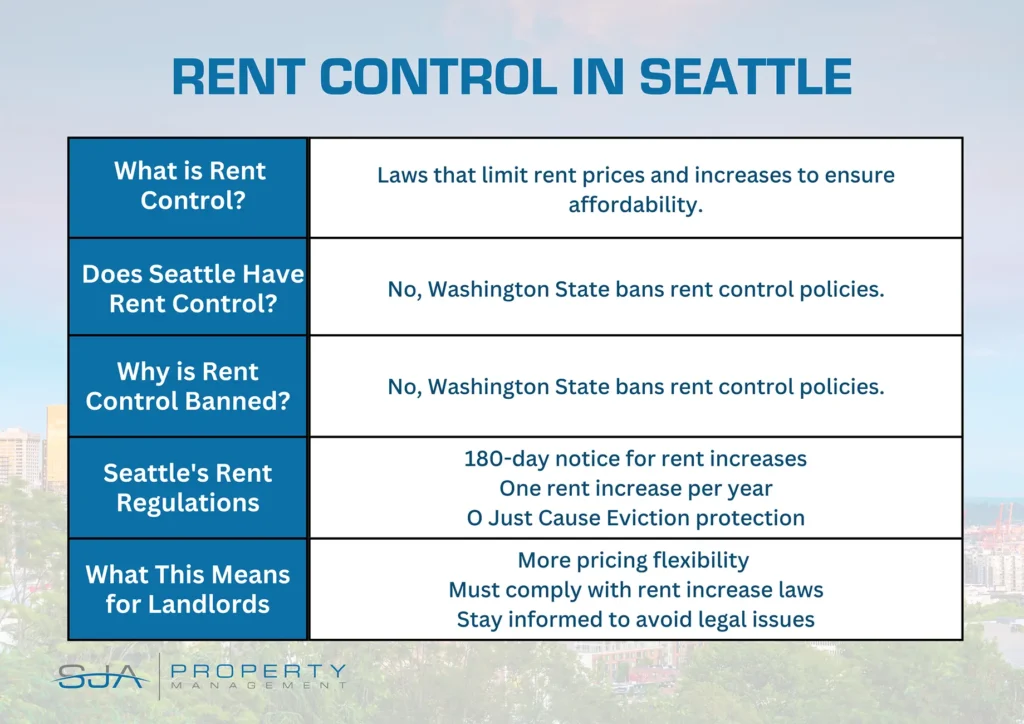As the cost of living in Seattle continues to rise, both tenants and landlords are feeling the pressure.
While working as property managers in the Seattle area, our team has seen the impact the high cost of living has had on landlords and their tenants. As tenants and landlords consider pricing, many are left wondering whether Seattle, Washington has rent control, and if so, how it works.
In this article, we’re breaking down what rent control in Seattle means, how it relates to state laws, and what it all means for landlords in Seattle.
What Is Rent Control?
Rent control refers to laws that limit the amount a landlord can charge for rent and how often rent can be increased. These policies are designed to ensure that rental prices remain affordable for tenants, particularly in high-demand areas. Rent control can also regulate the terms of rent increases, limiting how much rent can be raised within a specific time period.
In Seattle, rent control is not currently allowed but there are other tenant protections and regulations in place to address rent increases and rental housing affordability that landlords should be familiar with.
Does Seattle Have Rent Control?
The simple answer is no—Seattle does not have rent control. Washington State, as a whole, has a ban on rent control policies, meaning that municipalities such as Seattle cannot enact laws that directly limit how much landlords can charge for rent or how often they can increase rent.
Why Is Rent Control Banned in Washington State?
In 1981, Washington State passed the Washington State Rent Control Preemption Act, which prohibited local governments from implementing rent control measures. The law effectively banned rent control in Seattle and the rest of the state, ensuring that local governments could not regulate rents.
The decision to ban rent control in Washington State was largely based on the belief that rent control distorts the housing market. Some felt that rent control would give landlords a reason to not invest or maintain their properties, leading to lower-quality rental properties. Rent control policies are also seen as a deterrent for developers to build new rental housing, which only makes housing shortages even worse.
But that’s not to say there are no measures in place to ensure that both landlords and tenants are protected. Seattle has opted for other measures, like rent increase limits and tenant protections, to ensure affordable housing options.
Rent Control Alternatives in Seattle
To ensure tenants have a fair experience in the rental market, and housing prices don’t rise too quickly, Seattle has several alternatives in place. Let’s take a look at the laws and ordinances in place that landlords need to know.
Rent Increase Laws in Seattle
While landlords in Seattle are free to set their rental prices, there are limits on how much and how often they can raise rent. Seattle has specific laws that protect tenants from excessive rent increases:
- Notice of Rent Increase: In Seattle, landlords are required to give tenants at least 180 days’ notice before raising the rent.
- Rent Increase Limits: Seattle does not have a specific rent control law that limits how much a landlord can increase rent, but the Washington State Rent Increase Laws apply here. Under these laws, a landlord can only increase rent once every 12 months for most residential leases.
- Seattle Rent Stabilization Proposal: In recent years, there have been calls for rent control in Seattle, but none have passed. In 2024, the rent cap bill failed but that isn’t stopping supporters. Most recently, a new bill was filed by Rep. Emily Alvarado, D-Seattle, on January 9th, 2025 that sets out a 7% cap on yearly rent increases for existing tenants, with some exceptions.
Tenant Protection Laws in Seattle
Even though rent control is not in place, Seattle does have a range of tenant protection laws that are meant to help mitigate the potential impact of high rent increases and improve rental conditions:
- Just Cause Eviction: Seattle’s Just Cause Eviction Ordinance requires landlords to provide a valid reason for terminating a tenancy. This law is designed to protect tenants from arbitrary evictions, ensuring that they cannot be kicked out of their homes without a justifiable cause.
- Rental Registration and Inspection: Seattle requires rental properties to be registered with the city and undergo periodic inspections. This helps ensure that rental units are safe and habitable, and it provides tenants with a level of protection against poorly maintained properties.
- Tenant Relocation Assistance: If a tenant is evicted due to major renovations or redevelopment of the property, they may be eligible for relocation assistance. This helps ease the financial burden on tenants who must find new housing because of decisions that are out of their control.

What Does This Mean for Landlords in Seattle?
In our experience working with Seattle landlords, there are positive and negative implications due to the lack of rent control, especially as the rental market continues to experience high demand and rising prices.
While no rent control means landlords have greater flexibility in setting rental rates, it also means there’s a list of responsibilities and challenges that landlords must carefully navigate to ensure compliance with local laws and maintain tenant satisfaction.
1. Rental Market Demand and Pricing Flexibility
Seattle’s competitive rental market offers landlords the potential for increased rental income as demand for rental properties remains strong. With limited housing supply and a steady influx of new residents, landlords can take advantage of higher rental prices without being constrained by rent control regulations. This flexibility allows landlords to adjust rents based on market conditions and maximize their investment returns.
But it’s important for landlords to understand that this pricing freedom also comes with a responsibility to balance rent increases with tenant retention.
While it may be tempting to raise rents significantly, we’ve found that it’s essential for landlords to consider the long-term impact of such increases on tenant satisfaction and property vacancy rates.
Overly aggressive rent hikes may drive tenants to seek more affordable housing options elsewhere, increasing the risk of vacancies which can be costly for landlords.
2. Compliance with Rent Increase Regulations
As we discussed above, even though Seattle doesn’t have rent control, landlords must still follow certain regulations when raising rents. Failure to comply with these regulations can lead to legal disputes, fines, and potential damage to a landlord’s reputation.
For example, if you fail to provide the required notice or try to increase rent too frequently, you could be forced to reverse the rent increase or face legal action from tenants. Landlords must be diligent in staying informed about both local and state laws to avoid penalties and maintain a good relationship with tenants.
3. The Impact of Tenant Advocacy and Legal Resources
In a city like Seattle, where tenant advocacy groups are active and vocal, landlords must be proactive in understanding their legal obligations and ensuring they are operating within the law.
We always recommend landlords and rental property owners spend time learning about the landlord-tenant laws that apply in Seattle and Washington State. Because even if a landlord inadvertently violates a tenant’s rights or mishandles a rent increase, tenant advocates may become involved, leading to disputes that could result in legal costs, property damage, or negative publicity.
Ignoring these protections can result in lengthy legal battles or difficulty evicting tenants who do not adhere to lease terms.
4. Managing Rent Assistance Programs
While the lack of rent control gives landlords greater flexibility with pricing, it also means they may be required to work with various rent assistance programs. Seattle and Washington State have several programs designed to assist tenants who are struggling to pay rent. If a tenant qualifies for assistance, landlords are often required to work with these programs to ensure tenants can access financial help and avoid eviction.
While these programs can help ensure timely rent payments from tenants facing financial hardships, they also add another layer of complexity to the rental process. Landlords must stay informed about the eligibility criteria, payment processes, and timelines associated with these programs to ensure they receive payments promptly and avoid complications that could arise from missed rent.
Navigating Rent Control and Tenant Protections in Seattle
While rent control is not currently allowed in Seattle, the conversation about housing affordability and rent stabilization continues to evolve. As the cost of living in Seattle rises, it is likely that we will see more discussions on rent control and rent stabilization policies at the city, county, and state levels.
By staying informed, adhering to local and state laws, and being proactive in understanding the needs of tenants, landlords can thrive in Seattle’s competitive rental market. Whether you’re a seasoned investor or a new property owner, partnering with a knowledgeable property management team can ensure you’re navigating Seattle’s complex rental landscape smoothly and effectively.
Rent Control in Seattle FAQs
Does Seattle, Washington have rent control?
Seattle, Washington does not have rent control as Washington State has a law that bans rent control policies. Instead, Seattle has tenant protections and regulations around rent increases to keep rent prices from rising too quickly.
How much can a landlord increase rent in Seattle?
In Seattle, landlords can increase rent once a year when they give tenants 180 days notice. There are no specific limits on how much rent can increase, but rent hikes must be applied in a fair and non-discriminatory manner.
Is there a rent limit in Washington State?
Washington State does not have a statewide rent control policy or rent limit. Rent control is banned by state law, meaning local governments, including Seattle, cannot regulate rent prices directly.






